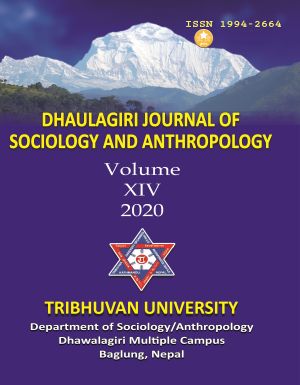Teachers’ Awareness Toward Students’ Psychosocial Wellbeing
DOI:
https://doi.org/10.3126/dsaj.v14i0.29454Keywords:
mental health, psychosocial wellbeing, school children, teachers’ awarenessAbstract
Ten to twenty percent of adolescents in the world experience mental health or behavioral problems. Emotional, psychological and social welbeing are the three components of mental health. Awareness on psychosocial wellbeing is an integral part of early identification of mental health issues. This paper describes teachers’ awareness toward psychosocial wellbeing of schoolchildren. Fifty teachers from three schools in Kathmandu metropolitan city were chosen purposively for information collection. Based on exploratory and descriptive research design, both quantitative and qualitative data were collected through self reported technique. Manual for the Youth Self Report and 1991 Profile by Achenbach (1991) on the basis of most commonly reported school children’s behavioral problems in literatures. The findings suggest that school children are going through behavioral issues and a majority of school teachers are aware of this. The findings also suggest that abundant numbers of teachers in schools are unaware of certain mental health issues and never pay attention to those areas. Moreover, teachers with trainings have higher tendency of awareness regarding psychosocial wellbeing of school children. This paper emphasizes need for a training on mental health to improve the current mental health issues in schools.




